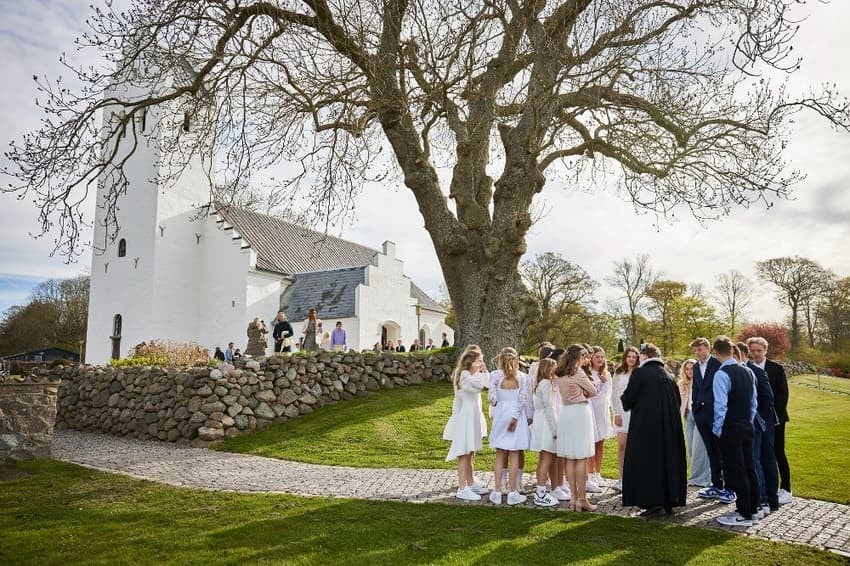How Danish churches plan to continue celebrating scrapped holiday

A large number of churches across Denmark have plans to celebrate Great Prayer day this year, even though the occasion is no longer a public holiday.
The coalition government controversially scrapped Great Prayer Day in 2023, meaning that this year is the first time since the 1600s that the population won’t get the day off work on the fourth Sunday after Easter.
The official website of the Church of Denmark, Folkekirken.dk, has posted over 100 Great Prayer Day events on its church calendar in locations across the country on Friday April 26th.
Most of the events will feature short, alternative church services, some with meditation, music or candle lighting, according to Folkekirken.dk.
One such church to put on an event for the now-cancelled public holiday is Nørremarkskirken in Jutland town Vejle.
The Vejle church will mark the occasion with an evening service on the Thursday before Great Prayer Day along with serving the traditional hveder, cardamom-infused wheat buns with a generous spreading of butter and perhaps jam.
“Those of us who are choosing to mark the day are reaching back in some way to its original conception. A day with a focus on penance and prayer. That got drowned in the day being used for confirmations,” church priest at Nørremarkskirken Tove Bjørn Jensen told newswire Ritzau.
Denmark originally introduced Great Prayer Day – officially an “extraordinary normal prayer day” in the late 17th century during the time of King Christian V, who decreed it.
The decree condensed religious holidays that had existed since before the Reformation – for example during the spring and at harvest, as well as several extra ones around Christmas time – into a single holiday.
It was a more serious affair in its early years. Inns and cellars were required to stop serving their beverages when church bells rang the preceding evening at 6pm. Everyone had to attend church – sober – the following day. Fasting until the end of religious services was also demanded.
As reference by Jensen, more recent years saw confirmation or konfirmation – a Lutheran ritual in which young teenagers say they believe in God, and also a coming-of-age rite in popular custom – commonly take place on Great Prayer Day.
READ ALSO: Why did Denmark have Great Prayer Day holiday and why was it abolished?
Confirmation does not have to take place on Great Prayer Day though – many are held on the Saturday after, and this is likely to become even more common from 2024 onwards.
Nevertheless, some 75 churches in Denmark have decided to have confirmations on April 26th, according to Folkekirken.dk.
Jensen said it is still important to observe the day, even though its status as a holiday is no more.
“Prayer is a central part of Christianity so we think it’s good reason for a church service with special focus on prayer,” she said.
Comments
See Also
The coalition government controversially scrapped Great Prayer Day in 2023, meaning that this year is the first time since the 1600s that the population won’t get the day off work on the fourth Sunday after Easter.
The official website of the Church of Denmark, Folkekirken.dk, has posted over 100 Great Prayer Day events on its church calendar in locations across the country on Friday April 26th.
Most of the events will feature short, alternative church services, some with meditation, music or candle lighting, according to Folkekirken.dk.
One such church to put on an event for the now-cancelled public holiday is Nørremarkskirken in Jutland town Vejle.
The Vejle church will mark the occasion with an evening service on the Thursday before Great Prayer Day along with serving the traditional hveder, cardamom-infused wheat buns with a generous spreading of butter and perhaps jam.
“Those of us who are choosing to mark the day are reaching back in some way to its original conception. A day with a focus on penance and prayer. That got drowned in the day being used for confirmations,” church priest at Nørremarkskirken Tove Bjørn Jensen told newswire Ritzau.
Denmark originally introduced Great Prayer Day – officially an “extraordinary normal prayer day” in the late 17th century during the time of King Christian V, who decreed it.
The decree condensed religious holidays that had existed since before the Reformation – for example during the spring and at harvest, as well as several extra ones around Christmas time – into a single holiday.
It was a more serious affair in its early years. Inns and cellars were required to stop serving their beverages when church bells rang the preceding evening at 6pm. Everyone had to attend church – sober – the following day. Fasting until the end of religious services was also demanded.
As reference by Jensen, more recent years saw confirmation or konfirmation – a Lutheran ritual in which young teenagers say they believe in God, and also a coming-of-age rite in popular custom – commonly take place on Great Prayer Day.
READ ALSO: Why did Denmark have Great Prayer Day holiday and why was it abolished?
Confirmation does not have to take place on Great Prayer Day though – many are held on the Saturday after, and this is likely to become even more common from 2024 onwards.
Nevertheless, some 75 churches in Denmark have decided to have confirmations on April 26th, according to Folkekirken.dk.
Jensen said it is still important to observe the day, even though its status as a holiday is no more.
“Prayer is a central part of Christianity so we think it’s good reason for a church service with special focus on prayer,” she said.
Join the conversation in our comments section below. Share your own views and experience and if you have a question or suggestion for our journalists then email us at [email protected].
Please keep comments civil, constructive and on topic – and make sure to read our terms of use before getting involved.
Please log in here to leave a comment.